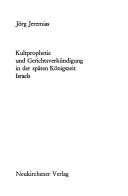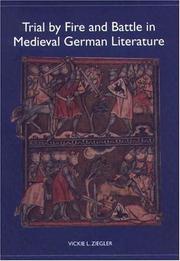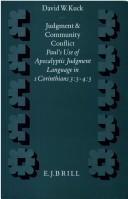| Listing 1 - 10 of 10 |
Sort by
|
Multi
ISBN: 9783799542845 3799542841 Year: 2010 Volume: 31 Publisher: Ostfildern : Thorbecke,
Abstract | Keywords | Export | Availability | Bookmark
 Loading...
Loading...Choose an application
- Reference Manager
- EndNote
- RefWorks (Direct export to RefWorks)
Ordeal --- Dueling --- Justice --- Ordalie --- Duel --- History --- Histoire --- --Jugement de Dieu --- --Combat --- --Moyen âge, --- History. --- Jugement de Dieu --- Combat --- Moyen âge, 476-1492

ISBN: 3788700017 9783788700010 Year: 1970 Volume: Bd. 35 Publisher: (Neukirchen-Vluyn) : Neukirchener Verl.,
Abstract | Keywords | Export | Availability | Bookmark
 Loading...
Loading...Choose an application
- Reference Manager
- EndNote
- RefWorks (Direct export to RefWorks)
Judgment of God --- Prophets --- Jugement de Dieu --- Prophètes --- Biblical teaching --- Enseignement biblique --- Bible. --- Criticism, interpretation, etc --- Bible --- Prophètes --- Criticism, interpretation, etc. --- Judgment of God - Biblical teaching
Book
ISBN: 2204075434 9782204075435 Year: 2004 Volume: 197 Publisher: Paris : Cerf,
Abstract | Keywords | Export | Availability | Bookmark
 Loading...
Loading...Choose an application
- Reference Manager
- EndNote
- RefWorks (Direct export to RefWorks)
Judgment of God --- Jugement de Dieu --- Biblical teaching --- Enseignement biblique --- Bible. --- Criticism, interpretation, etc --- Judgment --- Bible --- Biblical theology --- Criticism, interpretation, etc. --- Judgment - Biblical teaching
Book
ISBN: 2873562129 2873862459 2204068136 9782873562120 9782873862459 9782204068130 Year: 2001 Publisher: Namur Bruxelles Fidélité Racine
Abstract | Keywords | Export | Availability | Bookmark
 Loading...
Loading...Choose an application
- Reference Manager
- EndNote
- RefWorks (Direct export to RefWorks)
Christian dogmatics --- Dieu --- Mal --- Vie future --- Jugement de Dieu --- Morale chretienne --- Vie chretienne --- Religions --- Relations --- C1 --- geloof --- Jezuïeten - Zuid-Belgische provincie (1935-) --- Kerken en religie --- Christelijke spiritualiteit --- Christian spirituality --- Dieu - Ouvrages de vulgarisation --- Mal - Ouvrages de vulgarisation --- Vie future - Ouvrages de vulgarisation --- Jugement de Dieu - Ouvrages de vulgarisation --- Morale chretienne - Ouvrages de vulgarisation --- Vie chretienne - Ouvrages de vulgarisation --- Religions - Relations - Ouvrages de vulgarisation
Book
Year: 1988 Publisher: Brooklyn, New York Watchtower Bible and Tract Society of New York, Inc.
Abstract | Keywords | Export | Availability | Bookmark
 Loading...
Loading...Choose an application
- Reference Manager
- EndNote
- RefWorks (Direct export to RefWorks)
Révélation 1:3 --- la Bible --- Jésus --- Jean --- 'les choses profondes de Satan' --- le trône céleste de Jéhovah --- Israël --- le saint secret de Dieu --- le Royaume de Dieu --- Babylone la Grande --- Jah --- Harmaguédon --- le Jour du Jugement de Dieu
Book
ISBN: 9782130630586 2130630588 Year: 2014 Publisher: Paris : Presses universitaires de France,
Abstract | Keywords | Export | Availability | Bookmark
 Loading...
Loading...Choose an application
- Reference Manager
- EndNote
- RefWorks (Direct export to RefWorks)
Christianity and justice --- Religion and law --- Justice, Administration of --- Law, Medieval. --- Ordeal --- Judgment of God --- Justice --- Religion et droit --- Droit médiéval --- Ordalie --- Jugement de Dieu --- History --- Aspect religieux --- Christianisme --- Histoire --- Administration --- Law, Medieval --- Christianisme et justice --- Droit médiéval. --- Histoire. --- Droit médiéval --- History. --- Christianity and justice - History --- Religion and law - History --- Justice, Administration of - History --- Ordeal - History
Book
ISBN: 0198227353 0198219733 9780198219736 Year: 1986 Publisher: Oxford Clarendon Press
Abstract | Keywords | Export | Availability | Bookmark
 Loading...
Loading...Choose an application
- Reference Manager
- EndNote
- RefWorks (Direct export to RefWorks)
Ordeal --- Ordalie --- History --- Histoire --- Law, Medieval --- 34 <09> --- Medieval law --- Trial by ordeal --- Civilization, Medieval --- Criminal procedure --- Evidence (Law) --- Manners and customs --- Superstition --- Witchcraft --- 34 <09> Rechtsgeschiedenis --(algemeen) --- Rechtsgeschiedenis --(algemeen) --- History of the law --- anno 500-1499 --- Law, Medieval. --- History. --- Jugement de Dieu. Histoire. --- Godsoordelen. Geschiedenis. --- Ordeal - Europe - History
Book
Year: 1995 Volume: 4 Publisher: Roma : Nella sede dell'Istituto,
Abstract | Keywords | Export | Availability | Bookmark
 Loading...
Loading...Choose an application
- Reference Manager
- EndNote
- RefWorks (Direct export to RefWorks)
Free will and determinism --- God --- Judgment of God --- Predestination --- Salvation --- Libre arbitre et déterminisme --- Dieu --- Jugement de Dieu --- Prédestination --- Salut --- Early works to 1800 --- Omniscience --- Early works to 1800. --- Early works to 1800 --- Early works to 1800 --- Early works to 1800 --- Ouvrages avant 1800 --- Omniscience --- Ouvrages avant 1800 --- Ouvrages avant 1800 --- Ouvrages avant 1800 --- Ouvrages avant 1800 --- Joachim,

ISBN: 1571132910 9786611949242 1281949248 1571136509 9781571136503 Year: 2004 Volume: *29 Publisher: Rochester, N.Y. Camden House
Abstract | Keywords | Export | Availability | Bookmark
 Loading...
Loading...Choose an application
- Reference Manager
- EndNote
- RefWorks (Direct export to RefWorks)
Medieval judicial ordeals, especially trial by fire or battle, conjure up vivid pictures in the modern imagination. Yet popular perceptions of the Middle Ages leave the reader without a context in which to understand these most drastic of medieval judicial remedies. This book analyzes literary texts that provide some of the most vivid and detailed accounts of the medieval ordeal: the dramatic treason trials in late medieval Charlemagne epics. The two epics chosen - Stricker's 'Karl der Groe' and the 'Karlmeinet' - treat trial by battle as the living legal reality it was in those times, yet display very different attitudes toward feud and punishment in their respective (13th- and 14th-century) societies. Gottfried's 'Tristan' contains an ordeal by battle, of which the author approves, and an ordeal by fire, of which he does not, reflecting a common position of the intelligentsia of the time. Well after the condemnation of ordeals by the Fourth Lateran Council, the Kunigunde legend preserves the ordeal by fire much as it was portrayed in the mid-12th-century Richardis legend, while Stricker's short secular burlesque 'The Hot Iron,' written in the mid 13th century, makes sport of this formerly serious legal proceeding, reflecting its sudden abandonment as a legal proof following the council's decision. The study brings extensive background material in legal and cultural history to bear on literary texts, helping both medievalists and general readers understand the function of the ordeal in the texts as well as in the larger society for whom these works were written. Vickie L. Ziegler is professor of German and Director of the Center for Medieval Studies at the Pennsylvania State University.
German literature --- History of the law --- History of Germany and Austria --- anno 800-1199 --- anno 1200-1299 --- Godsoordeel in de literatuur --- Jugement de Dieu dans la littérature --- Ordalie dans la littérature --- Ordeal in literature --- Trial by ordeal in literature --- Ordeal in literature. --- History and criticism. --- Middle High German, 1050-1500 --- History and criticism --- Charlemagne Epics. --- Cultural History. --- Legal Proceedings. --- Literary Texts. --- Medieval Judicial Ordeals. --- Trial by Battle. --- Trial by Fire.

ISBN: 9004095101 9004266968 9789004266964 9789004095106 Year: 1992 Volume: 66 Publisher: Leiden New York Köln Brill
Abstract | Keywords | Export | Availability | Bookmark
 Loading...
Loading...Choose an application
- Reference Manager
- EndNote
- RefWorks (Direct export to RefWorks)
This study demonstrates that Paul in 1 Corinthians 3:5 - 4:5 is led by the rhetorical situation to emphasize God's final judgment as the affirmation of the individual Christian's work. Paul is not simply opposing his future eschatology to a Corinthian 'realized' eschatology. Rather, he is teaching the Corinthians to adapt their inherited belief in a corporate judgment to new concerns within the community. The exegetical study is set in the context of past scholarship on the questions of Paul's eschatology, his beliefs concerning judgment, and the role of eschatology in 1 Corinthians. Chapters on the functions of divine judgment in Jewish and Greco-Roman writings help to define the way early Christians thought of God's judgment and to suggest how Corinthian sensibilities influenced Paul's application of judgment language. This book contributes to ongoing debates about the apocalyptic theology of Paul and the eschatological views of the Corinthians. It will also be useful to scholars who are interested in the role played by ideas of divine judgment in the world of the New Testament.
Dernier jugement --- Dieu -- Jugement --- God -- Judgment --- God -- Oordeel --- Goddelijk oordeel --- Jour du Jugement --- Judgment Day --- Judgment of God --- Jugement dernier --- Jugement divin --- Jugement universel --- Justice de Dieu --- Laatste Oordeel --- Eschatology --- Eschatologie --- Jugement de Dieu --- Biblical teaching --- Enseignement biblique --- Bible. --- Criticism, interpretation, etc --- Biblical teaching. --- 227.1*2 --- -Eschatology --- -#GROL:SEMI-225<08> Supp 66 --- Last things (Theology) --- Religious thought --- Theology, Doctrinal --- God --- Brieven van Paulus aan de Corinthiërs --- Judgment --- Theses --- 227.1*2 Brieven van Paulus aan de Corinthiërs --- #GROL:SEMI-225<08> Supp 66 --- Criticism, interpretation, etc. --- Bible. N.T. Corinthians, 1st, III, 5IIII, 5 --- History of doctrines --- Primitive and early church, ca. 30-600 A.D. --- Bible --- N.T. --- Corinthians, --- Judgment of God - Biblical teaching. --- Eschatology - Biblical teaching.
| Listing 1 - 10 of 10 |
Sort by
|

 Search
Search Feedback
Feedback About
About Help
Help News
News